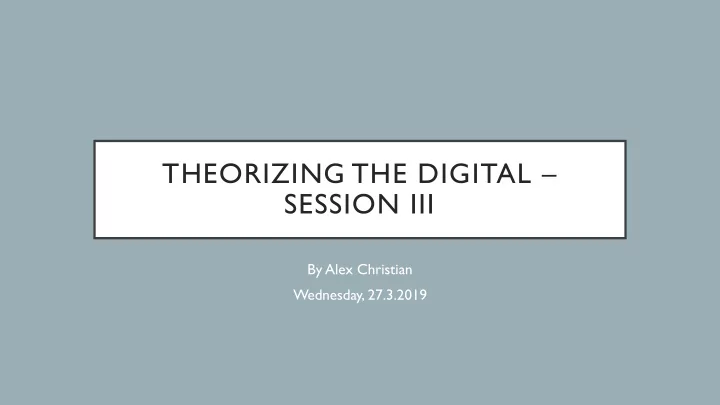

THEORIZING THE DIGITAL – SESSION III By Alex Christian Wednesday, 27.3.2019
RECAP Dery, K., Kolb, D., & MacCormick, J. (2014): Mazmanian, M., Orlikowski, W. J., & Yates, J. (2013): Working with connective flow: how smartphone use The autonomy paradox: The implications of mobile email devices is evolving in practice . for knowledge professionals .
THEORETICAL CONTRIBUTIONS Mazmanian et al. (2013) Dery et al. (2014) Extending the stable notion of autonomy Advancement from “duality of connects and towards a more dynamic understanding disconnects” to continually managing “connective flow” Outlining (unintended) collective Smartphones as devices for enhancing consequences of individually-restricted human agency through connective choice autonomy emerging from the use of mail devices Definition of job ideals as ongoingly enacted Away from a deterministic understanding of the together with technology (“performativity”) impact of smartphones as neutral and objective tools towards a “ performative ” understanding Work is reshaped by the affordances of technology
WEAKNESSES AND SHORTCOMINGS Mazmanian et al. (2013) Dery et al. (2014) Inadequate conceptualisation of the notion Unpolitical or even downplaying the difficulty “ commitment ” and hazard of continually managing “ connective flow ” Normativity : Autonomy = good and Assuming agency exclusively in humans and Commitment = bad not opening up for a perspective that agency could also lie in technology Respondents treated as not capable of Overemphasizing the impact of individual explaining their associations to technology smartphone use and neglecting the effects of correctly impression of “force fitted” further social and material aspects interpretations, bias towards the negative consequences of the use of mobile mail devices
NEW AND OPEN QUESTIONS Mazmanian et al. (2013) Dery et al. (2014) Are current reconfigurations of job ideals now What could be the larger consequences fixed or rather temporarily emergent? If the stemming from individually regulating the latter, then how could future job reconfigurations “connective flow”? look like? Who decides when it is too much commitment What is the right or wrong way of engaging with and too less autonomy? Is there a solution to the smartphones, if there is one at all? autonomy vs. commitment tension ? What positive collective consequences have been Asked the other way round: established through the use of mobile email How is people’s behaviour impacting technology? devices?
DISCUSSION Are technological devices enhancing (Dery et al., 2014) or inhibiting (Mazmanian et al., 2013) autonomy/human agency? Were the articles rather focussing on technology, people, or on the practices of humans together with technology? Could it be that the “overachievers” from today are the “regular achievers” from tomorrow? If yes, is that a desirable or rather undesirable development?
Recommend
More recommend